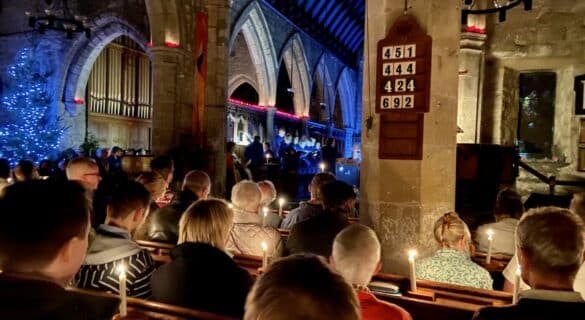Should your faith rely solely on the Bible?
A Catholic friend I used to work with once told me a surprising story of a meeting at his Belfast church. He was quoting a verse in the Bible when one of his members muttered (just loud enough so everyone could hear) “the Bible – that’s a Proty thing isn’t it?”, (Protestant thing). His comment broke the ice!
In fact Catholic teaching holds scripture in high regard as we will see, but it’s not their only authority. On the other hand, for most “Proty” evangelicals (myself included), the Bible is by far and away the book that has most influenced our lives. It reveals God, it shows us the way of salvation, it teaches us how to live. I, like many of you, love the Bible. I read it, I study it, I memorise it. But is the Bible our only authority?
“Sola Scriptura”
“Scripture alone” is a view, held by many evangelical Christians when it comes to authority. For these Christians the Bible isn’t simply an important authority in matters of faith, it takes priority, and even excludes, all other types of authority.
This view was born out of the Protestant Reformation in the sixteenth century, as a reaction against the authoritarian nature of the church and its priests. It asserts that scripture is the highest and only infallible authority for Christians. Each individual believer can read and interpret scripture with the Holy Spirit’s help.
But is this view of “only the Bible” right? Let’s summarise some differing perspectives
Catholicism
The Bible is a foundational but not exclusive authority for Catholic Christians. Catholics have three sources of authority. Holy Scripture is one. The second is Sacred Tradition, meaning, the oral teachings passed down through generations. For instance, Paul encourages Timothy (2 Tim 2:1–2) to pass on “the things you heard me say”, ie not only things that were written down.
The third authority is The Magisterium, the teachings of the Pope and the Bishops who provide clarification and consistency.
- Example: the Assumption of Mary, the mother of Jesus, is the Catholic belief that Mary’s body did not undergo decay after death. Instead, Mary was taken up, body and soul, into heaven in a special act of divine grace. But this is not stated anywhere in the Bible.
Critics of this view argue that Catholicism’s “triple authority” undermines the primacy of scripture and puts too much power in the hands of church leaders, including the Pope.
Anglicanism
I am often struck, when visiting a CofE church, how Anglican churches spend more time reading the Bible than many evangelical churches. Each service can have up to 4 readings: Old Testament, Psalm, Gospel and Epistle.
Anglicans try to maintain a “via media”, a middle way or a balanced view of authority. The CofE Articles of Religion state that scripture contains “all things necessary to salvation”, but Anglicans also value tradition, and reason. Of course, as with all denominations, there is a spectrum of Anglican churches and Christians — some will hold scripture more highly than others.
- Example: Church Structures — The hierarchy of the Anglican Communion, with bishops, archbishops etc, is not described anywhere in the Bible. Their roles, and the organization of the Anglican Church, were shaped by historical developments.
Critics comment that the challenge for Anglicans is maintaining balance – often, the emphasis on tradition can easily overshadow the authority of scripture.
Evangelicalism
Strictly speaking, evangelicalism is, of course, a tradition, not a denomination. Not all evangelicals hold to sola scriptura, but many hold to some variation of “scripture alone”. Sola Scriptura has already been explained, but what do critics say?
Well one thing they say is, if God really meant “scripture alone” must be our one and only authority, it seems odd that scripture itself doesn’t say this. Although the Bible affirms scripture as, “alive and active like a two-edged sword” (Hebrews 4) and that “all scripture is God-breathed, (2 Tim 3.16), it seems to be silent when it comes to its own authority.
Secondly, the list of books that make up the New Testament (the Canon) was determined by the church in the 4th Century, guided by the Holy Spirit. So, to say that scripture has authority over the church that defined it seems incoherent.
And thirdly, while this approach strongly promotes personal reading of the Bible, it leads to multiple interpretations, including over-literal interpretations. It can also minimise the value of tradition and scholarship (sola scriptura adherents sometimes neglect to ask, “What did Christians before us make of this passage?”)
All scripture has to be interpreted and, when we do that, we introduce “other authorities” we may not be fully aware of, such as my church tradition, my life experiences, and so forth. Being human means we cannot leave these to one side.
- Example: Evangelicals disagree widely on Bible passages regarding the role of women in church leadership.
And so it goes on. We could talk next about Methodists, whose idea of authority comes from their “Wesleyan Quadrilateral”. This four-fold authority recognises scripture as primary, but also highly values tradition, reason, and personal experience as sources of theological understanding. Methodists seek to discern God’s will, holistically, through all four of these.
Where does all of this leave us? Well before we all rush to defend our own corners …
What do we agree on?
All Christians agree on the Bible’s central and transformative power, but history has shaped each denomination’s understanding of its authority. Some regard the Bible as one important source of authority among several. For others, the Bible is their most important authority, while yet others would say the Bible is the only possible source of authority.
All our understandings of authority can be flawed — we are human after all – but all mainstream Christians agree that the Bible is authoritative and trustworthy; a compass in the world, a lamp for our feet and a light for our path (Psalm 119). Furthermore, most Christians also acknowledge its unique “dual authorship”, blending Godly inspiration with human expression.
Going back to the question in the title, a well-rounded faith must be firmly rooted in scripture, but should also acknowledge the value (and the biases) of our traditions and our lived experiences. Our differences, as Christians, should make for good discussion, they illustrate the rich diversity of God’s Church.
And lastly, let’s not forget that the Word of God, ultimately, is Jesus. So while the Bible is sacred, it’s Christ who we worship, not a book.
So perhaps in the end the question is not whether our faith should rely solely on the Bible, but how the Bible can help us to open our hearts to Christ; to the entirety of God’s voice, including scripture, tradition, intellect, and the experience of God in our daily lives.
What do you think?
This article was first published by Premier Christianity. All Chris’s work for Premier can be found here.
A variation of this article was published by the Baptist Times. All Chris’s work for BT can be found here. (please select Advanced Options and then Sort by Date)




Re: Should your faith rely solely on the Bible? In Chris Goswami’s article ‘Should your faith rely solely on the Bible?’ he writes that “As Baptists a well-rounded faith must be fixed on the person of Jesus and firmly rooted in scripture but should also acknowledge the value (and the biases) of our traditions and lived experiences, and the church meeting’s responsibility to discern.” However Jesus was the ‘The Word of God’ made flesh that came and lived among us. Jesus had a high view of scripture as the Word of God. He said that ‘the scripture cannot be broken’(John 10:35). He… Read more »
Thanks Tom — obviously i dont agree that we can somehow omit our context / background / lived experiences / prejudice .… even if we claim we can.
Also the Baptist Union’s Declaration of Principle which BU churches affirm does separate the authority of the Lord Jesus and the authority of scripture — difficult as that is to get our heads round.
I do appreciate your reading and taking time to write a thoughtful comment
My question is, when there are three or four-fold sources of authority and one contradicts the other, where does the final say lie?
If church tradition goes against the teaching of scripture, which wins out?
Thx Joel. But your question also applies to scripture itself. Eg if one interpretation of 1 Timothy 2:11–15 (on women remaining silent) concludes that this is an eternal truth for all time, but another interpretation says that Paul is addressing a specific situation at a particular time .….…. which one wins out?
So experience rationality and so forth cannot be left out. They are also “authorities”..
Do you remember Jesus’s issues with the Scribes and the Pharisees? There were times when they nullified the word of God because of their traditions. We have to separate what are human rules and that which is the word of God. Instinctively I remove my hat when I come into the church. This goes back to when I was with Campagners but is unnecessary to my salvation. Moreover, there is a scripture that says, that if a man has his head covered in worship he dishonours HIs head which is Christ. So my not wearing a hat in church is… Read more »
Been thinking about the relationship between Scripture and Christ ever since your interview with fellow Baptists on a Premier podcast following the BU Council vote on SSM. Whilst fully agreeing we worship Christ not the Bible, my major concern is that we drive a wedge between the written Word and the Living Word. Else we can reach the position that if we think Jesus is telling us something contrary to Scripture, this has greater authority. Or that certain parts of Scripture (say the words of Jesus written in red letters) have greater authority than NT letters or OT laws. Yes, we must… Read more »
Premier going further and further away from an evangelical basis it seems.
The Bible is the training manual, not the Garden itself, although some collect manuals without ever gardening hands-on. This training manual is written by the Master gardener, interpreted by gardeners, who should never forget where the original wisdom came from and do it their way. Hybrids look pretty but they increase opportunities for mutations which lack the survival bred into the originals. Some try to profit from alternative training manuals but no-one can match the Design and end up with weed-infested deserts.
The first mention of Purgatory in the Bible is in 2 Maccabees 12:46: “Thus he made atonement for the dead that they might be freed from sin.” from the Greek translation of the Bible quoted from by Kesus
Thanks Rosaleen. This comment was made on the Premier site where I used Purgatory as the example of a Catholic doctrine that isn’t mentioned in scripture. Rosaleen is correct that, at least in the Catholic Bible, Purgatory is referenced.
In the version of the article you see on THIS webiste (posted later) I changed the example from Purgatory to the assumption of Mary (which is not directly referenced in Protestant or Catholic Bibles).
It is only the Catholic church which mentions Pergutary and that is from the Apocrypha. Most free churches do not accept the writings between the Testaments. Purgatory sounds like the awful concept of limbus infanctum
Interesting that you should think so but limbus infanctum is not official Catholic teaching. The Eastern Churches also do not dismiss the Apocrypha but recognise all the scripture that came down to us from the Apostles as an intregal. Those who do not are missing out on some wonderful and inspiring parts of scripture. However in the end we are all following the Lord and accept the Trinitarian God as clarified by the council of Nicea as being the God who speaks to us through the scriptures.
Interesting article again mate
Well balanced and thoughtful
Many thanks
A very thought provoking article Chris. Thank you.